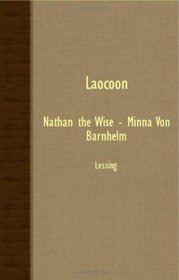Search -
LAOCOON - NATHAN THE WISE - MINNA VON BARNHELM
LAOCOON NATHAN THE WISE MINNA VON BARNHELM
Author:
LAOCOON NATHAN THE WISE MINNA VON BARNHELM - 1930 - INTRODUCTION - A feal ure in the story of German literature which all its critics have remarked is the rapidity of its development in the course of the eighteenth century, and the astonishng contrast between the opening and the closing decades of the period. The second half of the century witne... more »
Author:
LAOCOON NATHAN THE WISE MINNA VON BARNHELM - 1930 - INTRODUCTION - A feal ure in the story of German literature which all its critics have remarked is the rapidity of its development in the course of the eighteenth century, and the astonishng contrast between the opening and the closing decades of the period. The second half of the century witne... more »
ISBN-13: 9781408631355
ISBN-10: 1408631350
Publication Date: 10/26/2007
Pages: 316
Rating: ?
ISBN-10: 1408631350
Publication Date: 10/26/2007
Pages: 316
Rating: ?
0 stars, based on 0 rating
Publisher: Kellock Robertson Press
Book Type: Paperback
Members Wishing: 0
Reviews: Amazon | Write a Review
Book Type: Paperback
Members Wishing: 0
Reviews: Amazon | Write a Review




